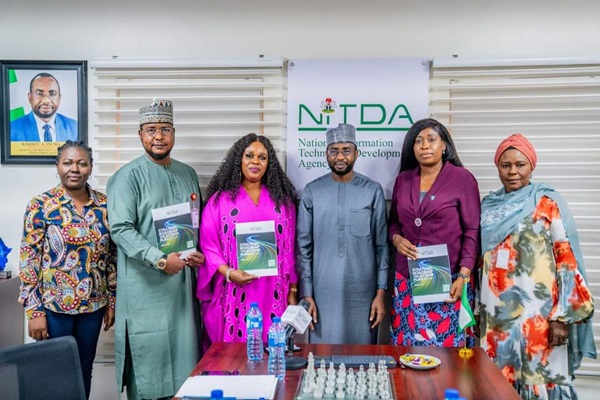
The National Information Technology Development Agency (NITDA) said it is poised to partner with relevant organisations to effectively disseminate the advantages of digital technology to all 774 local governments across the nation.
This information was revealed by the director-general of NITDA, Mallam Kashifu Abdullahi during a meeting with the senior special advisers to the president on community engagement (Barr. Chioma Nweze for Southeast, Ms. Moremi Ojudu for Southwest and Hon. Abdallah Yakassai for Northwest), who visited the agency to explore potential areas of collaboration in Nigeria’s digital transformation journey. This initiative is wholly in line with the current administration’s focal points, particularly in the realm of restructuring the economy for sustainable inclusive growth.
Emphasising the agency’s vision for a Nigeria where inclusive economic growth is nurtured through technological innovation, the NITDA DG highlighted that this vision corresponds with the president’s eight priority areas.
“The President aims to reform the economy for sustained economic growth; enhance national security for peace and prosperity; bolster agriculture for food security; improve infrastructure and transportation as growth facilitators; prioritise education, health and social investment for development; expedite diversification through digitisation, industrialisation, creative arts, and innovation; and enhance governance for efficient service delivery to citizens,” he remarked.
He mentioned that the agency has recently formulated its Strategic Roadmap and Action Plan (SRAP 2.0) for 2024-2027, with its pillars serving as tools to aid the president in delivering on all the presidential priority areas.
Detailing the eight pillars of the SRAP, Abdullahi underscored “Promote Digital Literacy and Nurture Talents” as a crucial pillar the document is based on, with a strong emphasis on inclusivity.
“To ensure inclusivity, we must enhance digital literacy among our citizens, hence we devised the National Digital Literacy Framework with an ambitious goal of achieving 95 per cent digital literacy by 2030. However, Mr. President has set a midterm target for us to reach 70 per cent by 2027,” he explained.
He further mentioned that the agency is collaborating with the Ministry of Education to integrate digital literacy into all academic curricula while simultaneously developing standardised training programs with certifications that would be essential for obtaining government employment.
“We have worked with the Head of Service to make it mandatory for government employees to be digitally literate. As for market traders, artisans, and others, they need literacy to utilise digital devices for tasks like internet banking, accessing government digital services and more. Therefore, we have been utilising various channels such as TV programs, social media, radio and roadshows to deliver these skills,” he added.
The NITDA director-general highlighted that the 3 Million Tech Talent programme as another initiative of the Ministry of Communications, Innovation and Digital Economy, in collaboration with the agency, aimed at identifying skill gaps in the country and enhancing youth capacity in locally and internationally sought-after skills.
“We have commenced the training and have already trained over 30,000 individuals, completing the initial phase, which was a pilot. We are now moving forward with the second phase of training,” he disclosed.
Providing an in-depth overview of the other seven strategic pillars which include building a robust technology research ecosystem, strengthening policy implementation and legal framework, promoting inclusive access to digital infrastructure and services, enhancing cybersecurity and fostering digital trust, cultivating an innovative and entrepreneurial environment, establishing strategic partnerships and collaborations and cultivating a dynamic organisational culture and agile workforce within NITDA, Abdullahi shared the diverse infrastructures, innovative solutions, sponsorships and training programmes the government has been offering nationwide.
In his response, Yakassai commended the DG NITDA for his insightful presentation, shedding light on the agency’s various initiatives to create a digitally empowered nation by enhancing the digital skills of Nigerians.
He expressed his team’s readiness to collaborate with the agency in disseminating the agency’s activities to the grassroots in all 774 local governments across the country.
“Given that the president is grassroots-oriented, he established this office to ensure that all government initiatives are brought down to the grassroots level. We must demonstrate to the people the significance of your programmes and how they can participate in them,” he emphasised.


